Listen. Read and say.
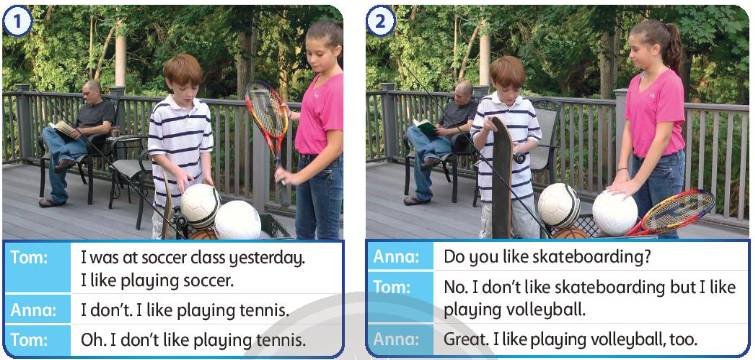
Tuyển Cộng tác viên Hoc24 nhiệm kì 26 tại đây: https://forms.gle/dK3zGK3LHFrgvTkJ6
Listen. Read and say.
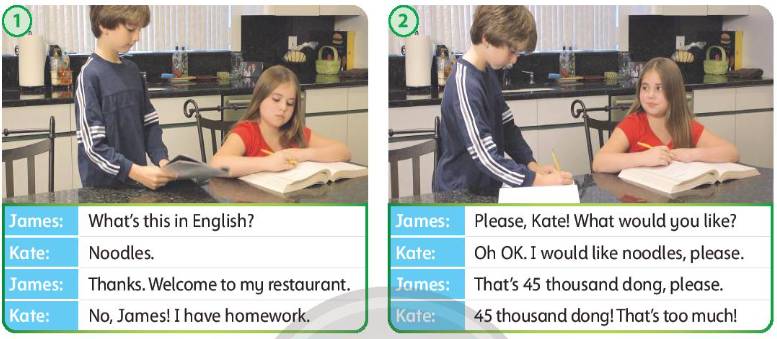
1.
James: What’s this in English? (Cái này trong tiếng anh là gì?)
Kate: Noodles. (Mì.)
James: Thanks. Welcome to my restaurant. (Cảm ơn. Chào mừng đến với nhà hàng của tôi.)
Kate: No, James! I have homework. (Không, James! Tôi đang làm bài tập về nhà.)
2.
James: Please, Kate! What would you like? (Làm ơn đi Kate. Bạn muốn ăn gì?)
Kate: Oh OK. I would like noodles, please. (Được. Làm ơn cho tôi chút mì.)
James: That’s 45 thousand dong, please. (Món này 45 nghìn đồng.)
Kate: 45 thousand dong. That’s too much! (45 nghìn đồng sao. Nhiều quá.)
Listen. Read and say.
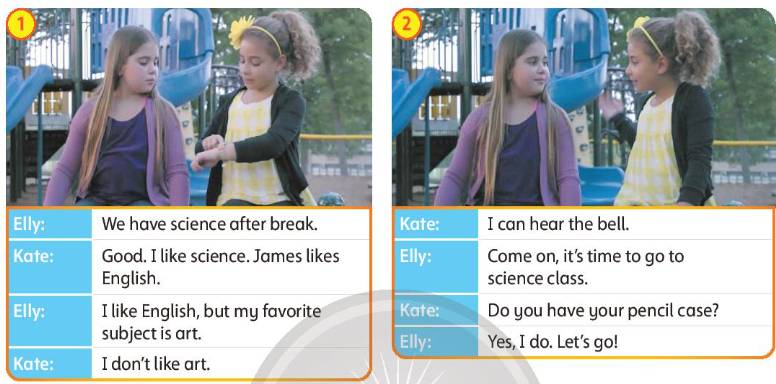
1.
Elly: We have science after break. (Chúng ta có khoa học sau giờ giải lao.)
Kate: Good. I like science. James likes English. (Tốt. Tôi thích khoa học. James thích tiếng Anh.)
Elly: I like English, but my favorite subject is art. (Tôi thích tiếng Anh, nhưng môn học yêu thích của tôi là môn mỹ thuật.)
Kate: I don’t like art. (Tôi không thích môn mỹ thuật.)
2.
Kate: I can hear the bell. (Tôi có thể nghe thấy tiếng chuông.)
Elly: Come on, it’s time to go to science class. (Nào, đến giờ học khoa học rồi.)
Kate: Do you have your pencil case? (Bạn có hộp đựng bút chì không?)
Elly: Yes, I do. Let’s go! (Vâng, tôi có. Đi nào!)
Listen. Read and say.
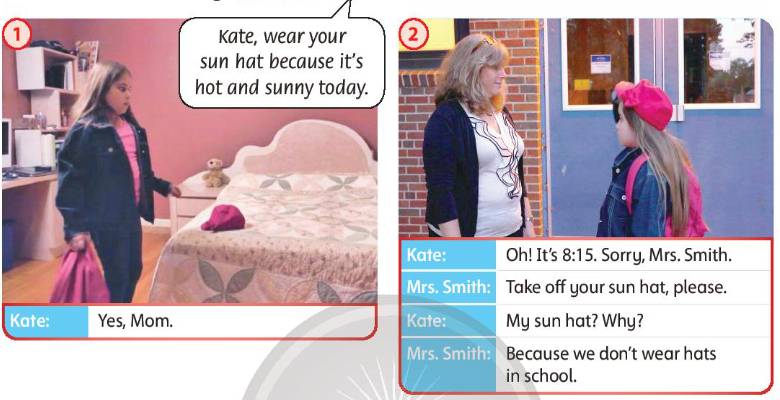
Mom: Kate, wear your sun hat because it's hot and sunny today.
(Kate, hãy đội mũ che nắng vì hôm nay trời nắng và nóng đấy con.)
Kate Yes, Mom.
(Vâng, thưa mẹ.)
2
Kate: Oh! It's 8:15. Sorry, Mrs. Smith. (Ôi! Bây giờ là 8:15 rồi. Em xin lỗi cô Smith ạ.)
Mrs Smith: Take off your sun hat, please. (Em vui lòng bỏ mũ che nắng ra nhé.)
Kate: My sun hat? Why? (Mũ che nắng của em? Tại sao ạ?)
Mrs Smith: Because we don't wear hats in school. (Bởi vì chúng ta không đội mũ trong trường.)
Read the Listening Strategy. Then try to say the numbers and measurements below. Listen and check.
Large numbers:
| 4,500 100,000 250,000 2.5 million |
Small numbers:
| 0 0.6 0.04 2.08 |
Years:
| 1500 1535 2000 2015 2150 the 1980s |
Fractions:
| \(\dfrac{1}{2}\) \(\dfrac{1}{3}\) \(\dfrac{1}{4}\) \(\dfrac{1}{5}\) \(\dfrac{1}{10}\) \(\dfrac{3}{8}\) \(1\dfrac{2}{3}\) |
Percentages:
| 50% 57% |
Ratios and ranges:
| 2:1 10:1 aged 18-25 from 0-100 in 3.1 seconds |
Temperature:
| -40°C 0°C 5°C 15°C |
3. Read and say the prices. Listen and check.
(Hãy đọc và nói giá cả. Nghe và kiểm tra.)
1. £2.25
2. €1.00
3. €0.50
4. $3.85
5. $7.20
6. £0.99
1. £2.25: two pounds twenty-five
2. €1.00 : one euro
3. €0.50: fifty cents
4. $3.85: three dollars eighty five
5. $7.20 : seven dollars twenty
6. £0.99: ninety nine pence
IX. Read the text carefully then decide whether the following statements are true (T) or false (F).
Many students listen to music while they are studying, and say that it helps them learn. Many parents and teachers say that music is just distracting, and that students are better studying in silence. Who is right? In a study, some scientists asked three groups of students to listen to a piece of music by Mozart or a relaxation tape for ten minutes, or just sit in silence for ten minutes. The students then did a ‘spatial reasoning’ test (a test about remembering shapes and imagining looking at objects from different directions), and the ones who had listened to the Mozart did better in the test. Taking part in musical activities and learning to play an instrument can improve verbal memory (the ability to remember words). The longer the training lasts, the better the improvement in the memory. So, there’s no excuse to give up the piano lessons!
53. Many students think it’s helpful to listen to music when studying.
54. Teachers say music helps students to better concentrate.
55. The students who had listened to Mozart did better in the spatial reasoning test.
56. Music training helps to improve memory
a. Read the definitions and then fill in the blanks with the new words. Listen and repeat.
(Đọc các định nghĩa và sau đó điền các từ mới vào chỗ trống. Nghe và nhắc lại.)
promise - say you will definitely do something to someone
decide - think carefully about different options and choose one of them
arrange - organize or prepare for something, especially an event to meet other people
refuse - say no to something very strongly
agree - have the same opinion as another person, or say you will do what they asked you
offer - say that you are willing to do something for someone
1. Can I go play now? I promise to clean my room later, Mom.
2. No! I ______________ to help him. He didn't help me last week.
3. I often ______________ to walk my 80-year-old neighbor's dog. She always says yes!
4. Did you ______________ to study abroad or will you study in your hometown?
5. Why don't we ______________ to meet at the movie theater at 7 p.m.?
6. After the meeting, we'll ______________ a company party, so all the new staff can have a chance to meet.
2. refuse
3. offer
4. decide
5. agree
6. arrange
3. Read the Speaking Strategy. Listen again and say if the student mentioned all the points in the task and responded well to the sales assistant’s contributions.
(Đọc Chiến lược Nói. Lắng nghe một lần nữa và xem học sinh có đề cập đến tất cả các điểm trong nhiệm vụ và phản hồi tốt những đóng góp của trợ lý bán hàng hay không.)
Speaking Strategy(Chiến lược nói)
When you are doing a speaking task, make sure you refer to all four points in the task. It is also important that you react and respond properly to what is said during the conversation.
(Khi làm bài nói, hãy chắc chắn rằng bạn đề cập đến cả 4 ý trong bài. Việc phản ứng và phản hồi lại những gì người khác nói trong cuộc hội thoại cũng quan trọng.)
Yes, the student mentioned all four points and responded well to the sales assistant’s contributions.
(Có, học sinh có đề cập đến tất cả bốn ý và có phản hồi về những đóng góp của người bán hàng.)
Listen and say.
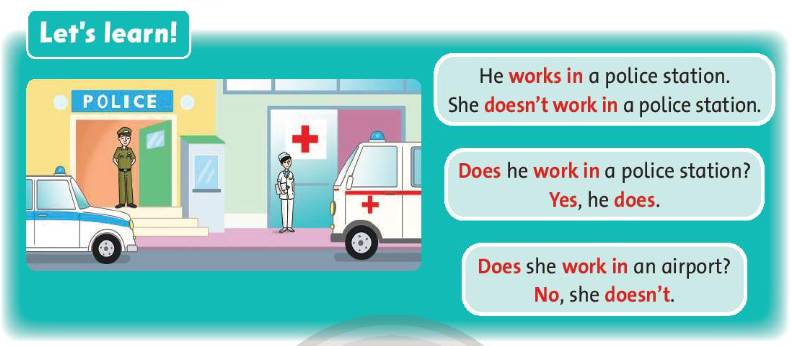
Hướng dẫn dịch:
1. Anh ấy làm việc trong một đồn cảnh sát.
Cô ấy không làm việc trong đồn cảnh sát.
2. Anh ấy có làm việc trong một đồn cảnh sát không?
Có, anh ấy có.
3. Cô ấy có làm việc ở sân bay không?
Không, cô ấy không.